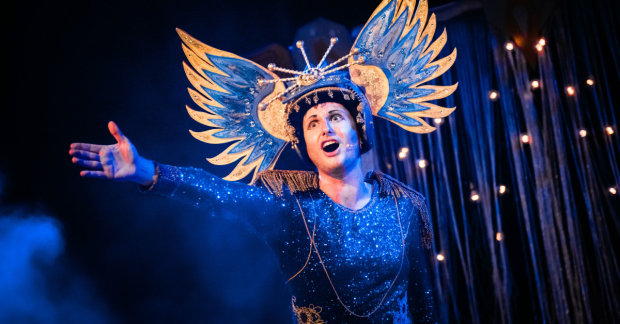Review: Dear Brutus (Southwark Playhouse)
"It isn’t good for me not to get the thing I want," is the tearful wail a few scenes into Dear Brutus, the play often described as JM Barrie’s Peter Pan for adults.
The wail belongs to Lob, an aged Puck who has invited a disparate group of characters to his country house. His aim is to send them into the magical wood that appears every midsummer’s eve – an alternative Neverland whose promise isn’t eternal childhood but second chances. The opportunity to walk the paths we wish we’d taken. To get the thing we want.
Whether this is always a good idea, indeed whether it’s even possible, are just two of the ideas explored in this strange, slippery play. And many more reveal themselves in the depths of the wood. The tussles between light and dark, good and evil, self-revelation and ignorance. The oft-lost line between reality and fantasy. And the power of fate versus character in how our lives unfold. (The play’s title comes from Cassius’s line in Julius Caesar: ‘the fault, dear Brutus, is not in our stars, / But in ourselves’.)
Its slippery nature might explain why the play is rarely performed – this is its first London outing in over 20 years. But while many (myself included) may find the text itself too elusive to be satisfying, this production has much to praise.
Director Jonathan O’Boyle deals admirably with the play’s tonal disparities. There are moments of whimsy, psychological dissection, high drama and pure pantomime, not to mention a strong resemblance to A Midsummer Night’s Dream. But by giving into the disorder and letting his cast run free, O’Boyle brings out both the script’s gems and some solid performances.
Edward Sayer wins the biggest laughs of the night as the philandering John Purdie, whose towering egotism is matched only by his total lack of self-awareness. Robin Hooper brings a sparkling, impish childishness to Lob. And Helen Bradbury is deliciously disdainful as Lady Caroline Laney.
Designer Anna Reid has her work cut out conjuring both a drawing room and a wood in Southwark's small theatre. But her simple, elegant ideas – like the canopy of lampshades whose bulbs descend to invoke an intimate grove – transport us perfectly well, especially when paired with Natasha Harrison’s clever movement direction, which transports the cast into their illusions.
But there are also some lulls in energy, and the change in each character when they emerge from the wood, however temporary this might be, could have been more distinct.
Then again, one feels Barrie would have disagreed with any notions of distinctness. The haze of ambiguity he spreads over this play remains impenetrable to the end. Are we better or worse off for having seen the life we could have lived? Is there only ever one path we’ll take, however many chances we’re given? Search the woods all you like, there are no answers to be found.
Dear Brutus runs at Southwark Playhouse until 30 December.












